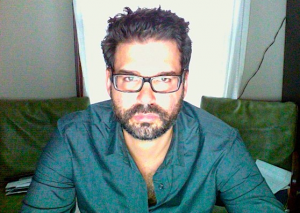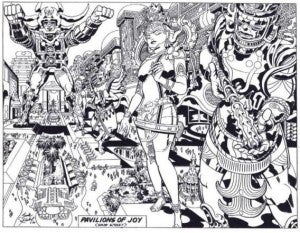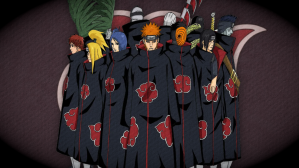Director Judd Ehrlich is best known for his documentaries Magic Camp and Run For Your Life–but it’s his current film, Science Fiction Land, that’s likely to be seen as his “opus” once it’s completed.”We’re dealing with science fiction, we’re dealing with comics, we’re dealing with multiple realities–all sorts of things that I think lend themselves to the film being really adventurous,” Ehrlich said of the filmmaking style.He has in mind a documentary film that incorporates some of the fantastical elements of its subject matter, bending genres and utilizing special effects–both contemporary methods and the kind that filmmakers might have had at their disposal if Lord of Light/Argo were really being made in the 1970s.The documentary, which was actually handed off to him by another filmmaker after years of work, is being funded through Kickstarter, and fans who felt like Jack Kirby, Roger Zelazny and Barry Ira Geller didn’t get the kind of representation they might have hoped in Ben Affleck’s Argo will be pleased to find that there’s quite a bit more information on the involvement of the comics legend–along with a book featuring his art–available to Kickstarter donors and viewers of the film.Ehrlich joined ComicBook.com to discuss the long-gestating documentary, how it’s different from the Hollywood version and what fans can do to support his work.So–launching this campaign at the same time as Argo is getting Oscar buzz is kind of ingenious.This was a project that we started long before Argo, so it was not made with Argo in mind–but the Kickstarter launch was done with Argo in mind because we felt like it was an opportunity to have some more interest in the story.We didn’t know quite how successful Argo would be, but we knew it was going to be a big film–that there was a lot of money and a lot of star power behind it, and it was going to get far and wide. If we wanted to get this film completed and get the finishing funds that we needed, it makes sense to launch the Kickstarter campaign before Argo. I think we launched it about eight days before the release of Argo.Now, most people start Kickstarter before they start the project, but that’s not the case here, right? At what point do you decide to crowfund?Well, this is my fourth documentary film and it’s the first one that I’ve done on Kickstarter. I really felt like this was a great project to put on Kickstarter for a number of reasons–one we’ve already talked about with Argo.Another is that the nature of the project really lends itself to Kickstarter. The mission of Science Fiction Land was to be open sourced–to have technology available to everyone and take it out of the hands of corporations and patent holders and through technology comes power, which is also one of the themes of the book Lord of Light.So I think Kickstarter being this incredible new technology where people from all over can help realize a project really makes sense with the project, and it sort of calls up the contrasts to a film like Argo that’s funded in a very different way–it has Warner Brothers behind it, it has millions of dollars, it has a huge marketing budget behind it and publicity machine and we’re making an independent film. We’re telling a story that’s more complex, that’s not as straightforward. it’s not a political thriller, this is a story that’s really layered and can only really be funded by something like Kickstarter.
Talking Argo’s True Story, Jack Kirby and Roger Zelazny With Science Fiction Land’s Ehrlich
Director Judd Ehrlich is best known for his documentaries Magic Camp and Run For Your Life–but […]












